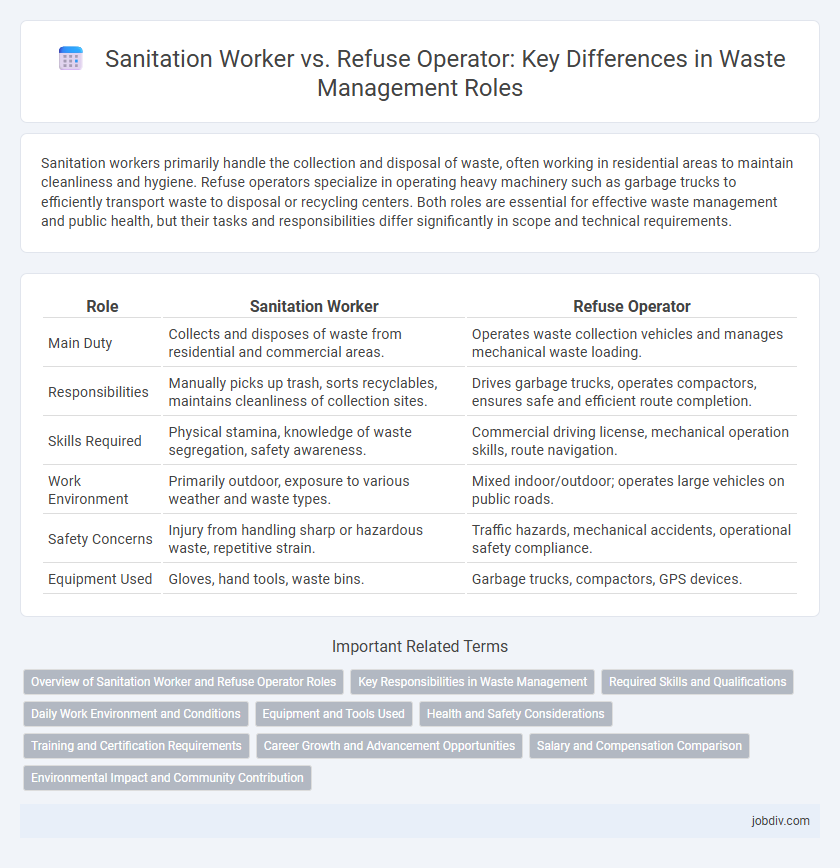Sanitation workers primarily handle the collection and disposal of waste, often working in residential areas to maintain cleanliness and hygiene. Refuse operators specialize in operating heavy machinery such as garbage trucks to efficiently transport waste to disposal or recycling centers. Both roles are essential for effective waste management and public health, but their tasks and responsibilities differ significantly in scope and technical requirements.
Table of Comparison
| Role | Sanitation Worker | Refuse Operator |
|---|---|---|
| Main Duty | Collects and disposes of waste from residential and commercial areas. | Operates waste collection vehicles and manages mechanical waste loading. |
| Responsibilities | Manually picks up trash, sorts recyclables, maintains cleanliness of collection sites. | Drives garbage trucks, operates compactors, ensures safe and efficient route completion. |
| Skills Required | Physical stamina, knowledge of waste segregation, safety awareness. | Commercial driving license, mechanical operation skills, route navigation. |
| Work Environment | Primarily outdoor, exposure to various weather and waste types. | Mixed indoor/outdoor; operates large vehicles on public roads. |
| Safety Concerns | Injury from handling sharp or hazardous waste, repetitive strain. | Traffic hazards, mechanical accidents, operational safety compliance. |
| Equipment Used | Gloves, hand tools, waste bins. | Garbage trucks, compactors, GPS devices. |
Overview of Sanitation Worker and Refuse Operator Roles
Sanitation workers are responsible for maintaining cleanliness in public spaces by collecting, transporting, and disposing of waste, ensuring hygienic environments. Refuse operators primarily focus on operating specialized vehicles to collect and haul residential, commercial, or industrial waste to designated disposal sites. Both roles are critical to effective waste management, supporting public health and environmental sustainability.
Key Responsibilities in Waste Management
Sanitation workers primarily focus on the collection, cleaning, and maintenance of public areas, ensuring the removal of litter and debris to promote hygiene and public health. Refuse operators are responsible for operating waste collection vehicles, managing the loading and transportation of residential and commercial refuse to disposal or recycling facilities. Both roles are critical in waste management, with sanitation workers emphasizing street and facility cleanliness, while refuse operators handle the logistical aspects of waste removal and transport.
Required Skills and Qualifications
Sanitation workers typically require physical stamina, knowledge of waste collection procedures, and basic safety training to efficiently handle residential or commercial waste. Refuse operators need specialized skills in operating heavy machinery such as garbage trucks, along with certifications in vehicle operation and workplace safety compliance. Both roles demand attention to environmental regulations and teamwork abilities to ensure effective waste management and sanitation.
Daily Work Environment and Conditions
Sanitation workers typically operate in urban and residential areas, collecting waste directly from households and businesses, often exposed to varying weather conditions and physical strain from handling bins and heavy loads. Refuse operators primarily work from collection trucks, managing vehicle operation and container compaction systems, frequently navigating through busy traffic and tight spaces during their routes. Both roles demand strict adherence to safety protocols due to exposure to hazardous materials, noise, and the risk of accidents in dynamic outdoor environments.
Equipment and Tools Used
Sanitation workers primarily use handheld tools such as shovels, brooms, and garbage bags to collect and manage waste manually, often working in residential areas. Refuse operators operate heavy machinery including garbage trucks with hydraulic lifts, compactors, and automated collection systems designed to efficiently gather, transport, and process large volumes of waste. The difference in equipment highlights the manual labor focus of sanitation workers versus the mechanized, vehicle-based operations managed by refuse operators.
Health and Safety Considerations
Sanitation workers face high risks of exposure to hazardous waste, sharp objects, and biohazards, necessitating stringent use of personal protective equipment (PPE) and rigorous training in handling infectious materials. Refuse operators encounter equipment-related dangers and traffic hazards while operating heavy machinery for waste collection and transport, requiring adherence to safety protocols and regular machinery maintenance. Both roles demand comprehensive health and safety measures to minimize occupational injuries and ensure compliance with regulatory standards in waste management.
Training and Certification Requirements
Sanitation workers typically require basic training in waste collection, safety protocols, and hazardous material handling, often completing certified courses such as OSHA safety standards. Refuse operators, responsible for operating heavy machinery like garbage trucks, must obtain specialized licenses including a Commercial Driver's License (CDL) and undergo more extensive training in vehicle operation, maintenance, and route management. Both roles demand compliance with local regulations and periodic certification renewals to ensure safety and efficiency in waste management operations.
Career Growth and Advancement Opportunities
Sanitation workers typically start with basic waste collection roles and can advance to supervisory or specialized positions in hazardous waste management through on-the-job training and certifications. Refuse operators often have opportunities to progress into equipment maintenance, fleet management, or environmental compliance roles due to their technical expertise in operating waste collection vehicles. Both careers offer pathways to municipal or private sector management positions, with advancement depending on experience, continuous education, and adherence to safety regulations.
Salary and Compensation Comparison
Sanitation workers generally earn an average salary ranging from $30,000 to $45,000 annually, with compensation influenced by location, experience, and union membership. Refuse operators typically receive a higher wage, averaging between $35,000 and $50,000 per year, reflecting the additional responsibilities of vehicle operation and waste collection. Benefits such as health insurance, retirement plans, and overtime pay vary but are often more comprehensive for refuse operators due to specialized training requirements.
Environmental Impact and Community Contribution
Sanitation workers directly manage waste collection from residential and commercial areas, significantly reducing environmental pollution and enhancing public health by preventing waste accumulation. Refuse operators specialize in the transportation and disposal of waste, optimizing landfill management and supporting recycling efforts to minimize landfill overflow and greenhouse gas emissions. Both roles contribute to community sustainability by ensuring efficient waste handling and promoting cleaner, safer urban environments.
Sanitation Worker vs Refuse Operator Infographic

 jobdiv.com
jobdiv.com